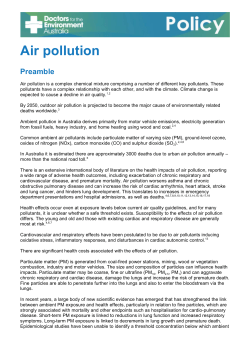
New report reveals air pollution could rise drastically;
New report reveals air pollution could rise drastically; outlines roadmap to devise models to curb emissions ‘Options to reduce road transport pollution in India’ presents structural and policy recommendations to arrest current pollution trends November 11: A new report by The Energy and Resources Institute (TERI), University of California, San Diego (UCSD) and the California Air Resources Board (CARB) says that if current trends of vehicle population, fuel and emission standards persist, PM 2.5 emissions will increase by a factor of three, and those of NOx will increase by a factor of five. The transport sector contributes about 15 to 50 per cent of PM 2.5 emissions in cities, and is a dominant contributor to NOx emissions, says the report. The World Health Organization (WHO) estimates that of the 67 risk factors studied in their Global Burden of Disease project, outdoor air pollution was ranked fifth in mortality and seventh in health burden in India, contributing to over 627,000 deaths and 17.7 million healthy years of life lost in 2010. The new report titled ‘Options to reduce road transport pollution in India’ establishes the scientific basis for reducing emissions, the technologies available, and governance issues that need to be urgently addressed to improve air quality in Indian cities. Said Dr. R K Pachauri, Director General, TERI: “We should go beyond technological transfers and evolve pathways for pollution control as there are co-benefits of reducing greenhouse gases and reducing the health burden. We need to develop larger frameworks to mobilize resources and invest in technological innovations. This report will provide intellectual inputs to formulate specific pollution control models for States, and this will require the intervention of not just the government, but all stakeholders.” Said Dr. Mary Nichols, Chairman, CARB: “In 1991, there were 20 million vehicles in India. The number had skyrocketed to 140 million in 2011, and by 2030, vehicle population is expected to reach a staggering 400 million. We need multiple strategies to bring regulatory agencies and the regulated communities together and provide incentives to reduce the pollution load.” Vehicular emissions contribute to particulate matter (PM) smaller than 2.5 micrometers (PM 2.5) and to Nitrogen oxides, NO and NO2 (NOx). NOx in turn leads to the production of ozone. PM 2.5 is the dominant contributor to premature deaths and numerous other illnesses, followed by ozone and NOx, and these are the major contributors to agricultural impacts, says the report. Said Prof. V Ramanathan, Distinguished Professor of Atmospheric and Climate Sciences, University of California, San Diego (UCSD): “Tackling air pollution may seem a complex problem, but California has demonstrated how drastic reductions in air pollution can be achieved. We simply cannot ignore the linkages and the multidimensional impacts of air pollution – for instance, ozone pollution leads to massive crop losses.” The report makes 12 specific recommendations for immediate action: Building and monitoring information; Upgrading fuel quality; Tightening vehicle emission standards; Upgrading in-use testing (inspection and enforcement); Fostering new engine management technology; Encouraging fleet modernization; Shifting transportation to other modes; Promoting non-motorized means of transport (walking and cycling); Increasing distribution of electric and hybrid vehicles; Using microgrids for electric and hybrid vehicles; Improving integrated land-use planning; and, Increasing cooperation between the California Air Resources Board (CARB) and the Union and State Governments in India. TERI-UCSD-CARB collaboration Without affecting its impressive economic growth, California has drastically cut down its emissions. In the 1960s, California had one of the highest air pollution levels in the world, and this triggered a public health outrage. Over the past 40-50 years, California has succeeded in reducing the levels of all air pollutions by 75 to 90 per cent though a series of measures. In particular, it has significantly reduced black carbon and particulate pollutants from automobiles. On the other hand, 80 per cent of cities in India, which have comparatively much fewer vehicles, have exceeded the ambient air quality standards prescribed by the Government of India. And this is worsening air quality and leading to a plethora of health problems. There is mounting evidence now to show that the transport sector is largely responsible for the increase in the concentrations of particulate pollutants. In an attempt to replicate the best practices, the University of California, San Diego (UCSD), the California Air Resources Board (CARB) and The Energy and Resources Institute (TERI) launched a programme – India California Air Pollution Mitigation Programme (ICAMP) – in 2013, to learn from air pollution control measures implemented in California to mitigate vehicular emissions and improve air quality in Indian cities. Based on research and dialogues between Indian and Californian experts, the project partners have now come up with this new report. ABOUT TERI: The Energy and Resources Institute (TERI) is an independent, not-for-profit research organization deeply committed to every aspect of energy, environment, and sustainable development. From providing environment-friendly solutions to rural energy problems, to helping shape the development of the Indian oil and gas sector; from tackling global climate change issues across many continents to enhancing forest conservation efforts among local communities; from advancing solutions to growing urban transportation and air pollution problems to promoting energy efficiency in Indian industries, the emphasis has always been on finding innovative solutions to make the world a better place to live in. All activities at TERI move from formulating local and national–level strategies to suggesting global solutions tackling critical energy and environment related issues. Headed by Dr R K Pachauri, also the chairperson of the Nobel Peace Prize winning climate change body, IPCC, TERI has emerged as an institution of excellence for its path-breaking research, and is a global brand widely respected by political leaders, policy makers, corporate entities as well as the civil society at large. For more information please contact: TERI Zainab Naeem: 8800286575 S S Jeevan: 9717324802 Ketchum Sampark Pvt Ltd. Varun Chopra: 9811241427 Prashant Kr. Gunjan: 9650026623 Sharat Shyam: 9953860601
© Copyright 2025





















